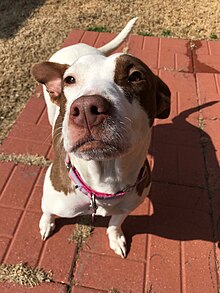DoggoLingo

DoggoLingo, also referred to as doggotalk, woof, bork, and dog-speak, is an Internet language that is created from word conversion, meme lexicon, and onomatopoeia. Emerging in the 2010s,[1] DoggoLingo is implied to be a dog's own idiom, and is presented as what humans have long believed goes on in the canine brain. Elyse Graham, assistant professor at Stony Brook University, describes DoggoLingo as "upbeat, joyful, and clueless in a relentlessly friendly way".[2]
Structure[]
DoggoLingo appends various diminutive suffixes "-o", "-er", "-ino" to existing English words (e.g. dog turns into doggo,[3] pup turns into pupper,[4]) as well as DoggoLingo words that have been created (e.g. pupper turns into pupperino, bork turns into borker).[1] DoggoLingo relies heavily upon onomatopoeia: Words such as blep, blop and mlem[5] describe the action of a dog sticking out its tongue; bork, boof, woof describe the various canine barking sounds. A dog with a fluffy coat may be called a floof or a fluff. DoggoLingo follows a similar rudimentary style to create its verbs (e.g. doin me a in place of present participles with the speaker as object, such as doin me a scare "scaring me") and adjectives (e.g. heckin in place of degree modifiers such as extremely). 'Heck' is frequently used in place of more conventional expletives. Some words also come from eye dialect spellings of English words, such as fren "friend".
Origin[]
DoggoLingo emerged in the 2010s,[1] but its exact origin is unknown. Various social media accounts such as WeRateDogs (Twitter), Dogspotting (Facebook), as well as social news aggregation and imageboard websites like 4chan, Reddit, or Tumblr have aided in popularizing the use of DoggoLingo by consistently using or hosting content that uses the lingo on their Internet pages. In 2014, the Dogspotting Facebook account gained popularity, especially in Australia where coincidentally adding "-o" to the end of words is also a feature of Australian slang.[3] Usage of DoggoLingo peaked around 2017.[1]
Examples[]
| Lingo Word | Base Word | Meaning |
|---|---|---|
| Doggo | Dog | An affectionate term for dogs. |
| Bork or Boof | Bark | Lingo word for "Bark", commonly used in memes. |
| Blep or Mlem | The action of an animal sticking out their tongue.[6][3] | |
| Gib | Give | A word a dog would use while begging for a snacc (snack). |
| Hooman | Human | A word for "human" commonly used in comedy to illustrate an animal's point of view |
| Pupper or Pupperino | Puppy | An affectionate word for puppies |
| Snacc | Snack | |
| Woofer, Floofer, or Boofer | A word for a very big dog used affectionately | |
| Fren | Friend | A word for friend, commonly used to illustrate the dog's point of view towards their owner or other dogs |
| Henlo | Hello | An affectionate way of saying "hello".[7] |
Other animals[]
Some other animals are referred to differently in DoggoLingo: One would refer to a snake as snek[8] or danger noodle, a human being as hooman, a cat as catto (cf. doggo), a bird as birb etc.
Internet fan groups for other animals have adopted many of the conventions of DoggoLingo for their own related languages for their preferred animals (like Posso or Poss-speak for opossums).[citation needed] Lolcats may be a precursor to DoggoLingo. Many aspects of DoggoLingo have also been adopted into the slang terminology of the furry fandom, called “furspeech”.
References[]
- ^ a b c d "What Does doggo Mean? | Slang by Dictionary.com". Everything After Z by Dictionary.com. Retrieved 2020-04-10.
- ^ "The weird underside of DoggoLingo - OxfordWords blog". OxfordWords blog. 2017-08-01. Archived from the original on 2019-04-02. Retrieved 2018-02-26.
- ^ a b c Boddy, Jessica (April 23, 2017). "Dogs Are Doggos: An Internet Language Built Around Love For The Puppers". NPR. Retrieved October 3, 2021.
- ^ "PUPPER (noun) definition and synonyms | Macmillan Dictionary". www.macmillandictionary.com. Retrieved 2020-04-10.
- ^ "What Does mlem Mean? | Slang by Dictionary.com". Everything After Z by Dictionary.com. Retrieved 2020-04-10.
- ^ "blep". Dictionary.com. Retrieved December 18, 2020.
- ^ Iseli, Marcel. ""Henlo": Here's What It Really Means and Where It Comes From". Linguablog. Retrieved 1 June 2021.
- ^ "What Does snek Mean? | Memes by Dictionary.com". Everything After Z by Dictionary.com. Retrieved 2020-04-10.
- Internet memes
- Internet slang
- Dogs in popular culture
- 2010s fads and trends